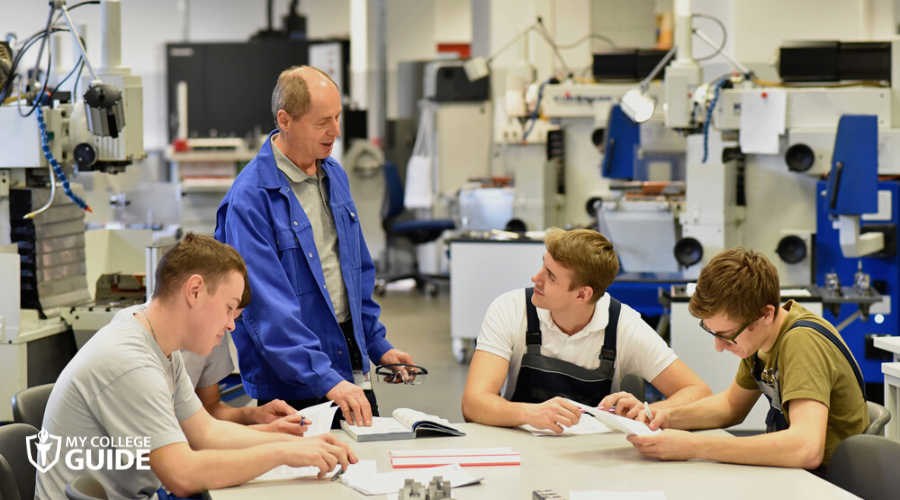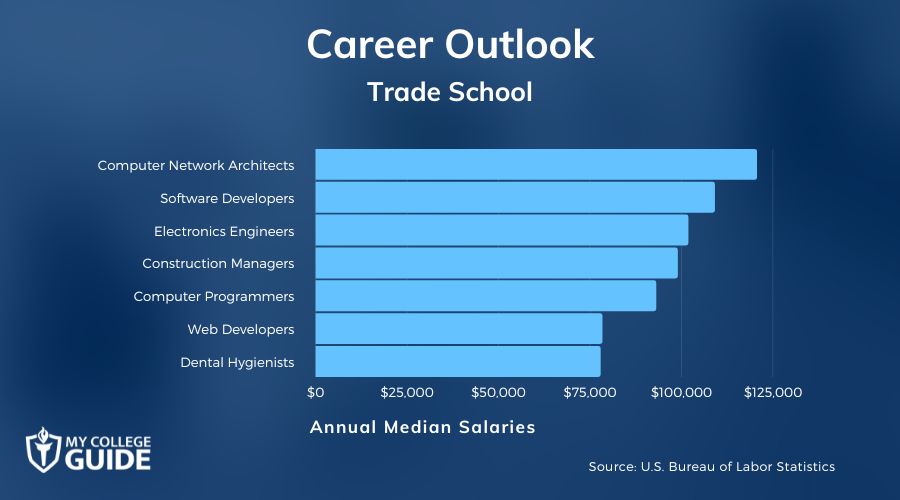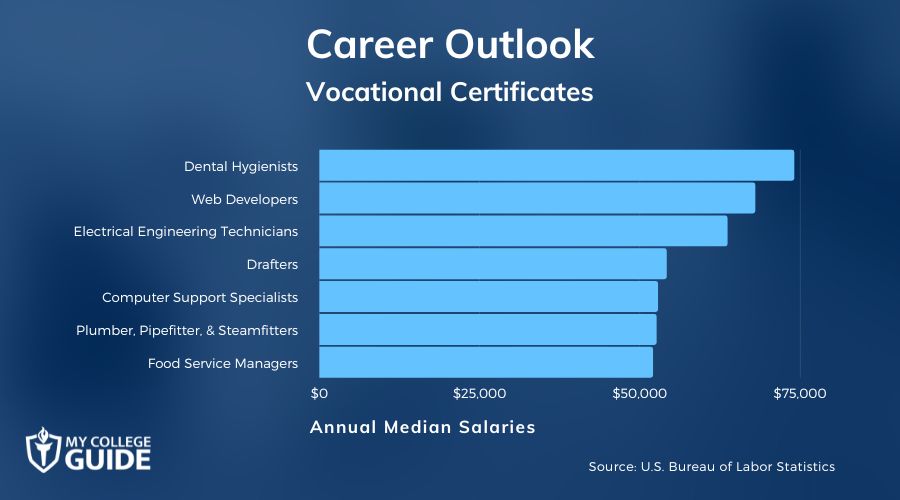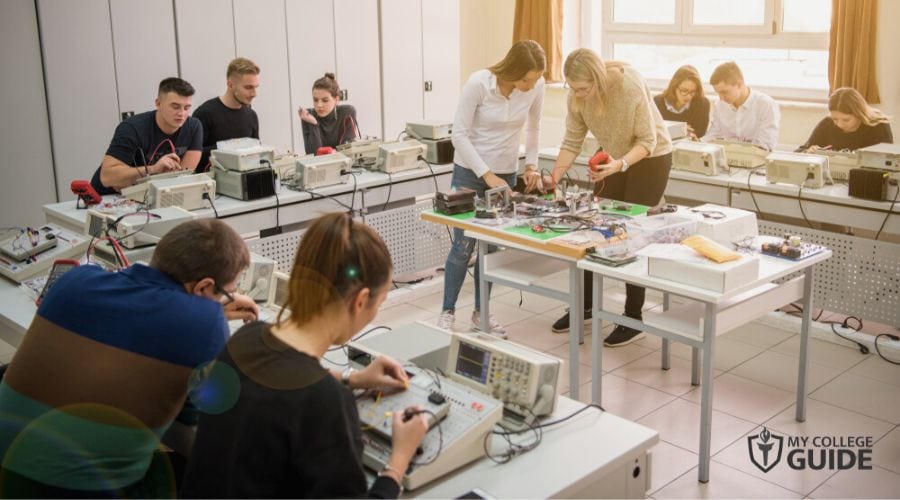Online vocational schools provide students with the opportunity to specialize in a skill while gaining work experience. With this industry experience, you should be prepared to enter the workforce and begin earning.

A four-year college may not be the best option for everyone, which is why many people pursue online trade classes. Vocational technical colleges are great for people who don’t want a four-year degree as well as those who are looking to advance or pivot their careers.
Editorial Listing ShortCode:
Continue reading to see if online vocational schools are a good fit for you.
Online Vocational Schools and Colleges

Online tech schools provide career-focused programs that allow students to begin working and earning in a shorter amount of time than if they had chosen to pursue a bachelor’s degree. Generally, vocational school programs last between a few months and a year.
Online vocational schools provide a varied approach to education. The programs that are offered range from locksmithing to cosmetology. Many online vocational classes take place from the comfort of your own home, but it is also common for them to have an on-campus portion.
Vocational school programs place an emphasis on the practical implementation of the skills you learn in class. Depending on your area of study, it may be essential to work with equipment. Your time spent on campus could be essential to learning the proper skills.
Editorial Listing ShortCode:
When doing your research, you’ll want to see whether or not your desired program has an on-campus portion. Online vocational schools may have a rigorous class schedule because of the accelerated pace, so you’ll want to ensure commuting is efficient and feasible.
Vocational school programs may provide a variety of uses as you prepare for or enter your career. Some of these benefits may include:
- Ability to change careers
- A shorter amount of time to complete education
- More cost-effective
- Your skills will directly apply to the job you take
Vocational schools don’t have courses that are shared across programs. Students may choose from an array of different trade school majors, but there are some trade school online programs that are more popular than others. According to the Bureau of Labor Statistics, these include:
- Auto mechanics
- Electrician
- Welding
- Construction management
Online vocational school programs teach students relevant and in-demand skills. Many people who pursue online trade classes do so because they want to start earning as soon as possible. Online trade classes may be a great choice for those who want to accelerate their career.
Types of Vocational Programs
Whether you are looking for on-the-job mentorship and hands-on training, or looking to obtain a degree, there are a variety of vocational programs available to you.
It’s a good idea to do some research into each program to see what fits your needs the best.
Apprenticeship Programs

An apprenticeship program is a type of vocational program that combines academic instruction with mentorship. These programs may provide more training for an extensive period of time in order to prepare you for your field.
Apprenticeship programs pair students with trained professionals. This means that students not only receive practical on-the-job training, but they also closely work with seasoned professionals who have years of experience to pass on.
These programs may last anywhere from two to six years, and in some cases, you may receive a wage. An apprenticeship program may lead to a licensure exam, which could be required before you’re permitted to work without a supervisor. The experience you gain from an apprenticeship program may immediately qualify you for a job.
Associate Degree Programs

Associate degree programs are programs that give you an education similar to what you would receive in pursuit of a bachelor’s degree, but in an accelerated period of time.
Associate degree programs are similar to bachelor’s degree programs because they take a holistic approach to education. In this program, students usually study general courses and basic ones that pertain to their specific major.
The benefits of an associate degree are that it may lead to a bachelor’s degree and they may lead to higher earning potential than a high school diploma.
Diploma Programs

A diploma program may be what many imagine when they imagine online trade school classes. This program provides an accelerated curriculum that is designed to qualify you for your chosen field.
Diploma programs are considered non-degree awards that qualify you for the workforce without being considered as rigorous as a four-year degree. These programs are designed to last anywhere from a few weeks to a year.
Editorial Listing ShortCode:
The main benefit of a diploma program is that it allows you to choose a field, study, and begin earning in a shorter amount of time than other programs.
Industry Certification Programs

An industry certification program is often an intermediary program that is intended to prepare you for a licensure exam. It demonstrates your commitment to education and may make you more marketable.
Industry certification programs provide a curriculum where students take classes they need to master to pass the licensure exam. These programs tend to last between a few weeks and a few months. Industry certification programs can help your career by giving you essential skills for your field. Not only do you learn valuable skills, but you also prove your dedication to professional growth by taking this program.
Getting the Skills You Need From the Comfort of Home

If you are working full-time or juggling other responsibilities, you may find that attending school online is the best option for you. Instead of attending night or weekend classes, you log-in to your courses from the comfort of home at a time that is convenient for you.
If you are a self-starter and want to get the skills you need without sacrificing your current job or family time, this might be an option worth considering. A number of universities offer vocational training through online study. Check out the list below and click on any college to get more information about their online programs.
Most Popular Vocational School Programs

The best vocational school programs are those that pay well and offer long-term job security. You want to enter a field in which you can grow professionally, and where your skills will be in demand for years to come.
Editorial Listing ShortCode:
Vocational school programs in the healthcare, business, and legal fields tend to be popular choices, but schools offer a diverse range of options. Here are some of the career possibilities in a variety of fields:
Medical, Dental, and Pharmacy

Vocational programs within the medical, dental, and pharmacy sectors can include anything from medical billing and coding to pharmacy technicians.
- Medical Billing and Coding: Medical billers and coders analyze patients’ medical documentation looking for diagnoses and treatments, then determine the appropriate code and record that for insurance billing purposes. They are the middle person between physicians and insurance companies, managing important, confidential data.
- Dental Assistant: A dental assistant works directly with the dentist, preparing instruments, assisting with procedures, taking impressions, and discussing dental care with patients. They may also take on administrative tasks such as updating records or scheduling appointments.
- Pharmacy Technician: Pharmacy technicians communicate with patients and relay their needs, questions, and concerns to the pharmacist. They also handle pharmaceutical inventory.
If the medical field is your passion, one of the above vocational programs may be a good choice for you.
Physical Therapy

Physical therapy vocational programs help you learn the skills needed to assist patients in various ways.
- Physical Therapy Aide: An important part of the support team, physical therapy aides set up therapy rooms, help patients into the room and wash linens. They may also take care of clerical tasks.
- Occupational Therapy Aide: An occupational aide is a support person during occupational therapy, preparing the room and equipment for patient appointments and sometimes taking care of clerical tasks such as scheduling appointments and ordering supplies.
If you’d like to assist physical or occupational therapists, an aide vocation program may be right for you.
Veterinary

If animals are your passion, perhaps consider a veterinary-based vocational program.
- Veterinary Assistant: This position takes on duties such as feeding, weighing, and taking the temperature of animals, cleaning cages, providing medicine, and basic caregiving before and after procedures. They may work in veterinary clinics, animal hospitals, shelters, and/or zoos.
- Veterinary Technician: Veterinary technicians work closely with animal patients while being supervised by licensed veterinarians. Technicians complete medical tests that help diagnose an animal’s ailment.
A vet vocation program can set you up with the skills you may need to work in a veterinary office and put your love of animals into action.
Trainer / Instructor

Perhaps you prefer to help others reach their goals. If this sounds like you, then a trainer/instructor program may be what you’re looking for.
- Certified Personal Trainer: This fitness guru evaluates clients’ abilities, sets fitness goals, and provides feedback and encouragement to help them succeed. They are also educated in health and nutrition.
- Dog Obedience Trainer / Instructor: A dog obedience trainer or instructor teaches commands to dogs and owners. They may work on basic commands like sit and stay for house pets, more complex tricks for show dogs, or even train future therapy or aide dogs.
As you can see, being a trainer is not limited to helping just people, but you can also help animals.
Electrical Technician

Electrician technician programs offer a lot of variety based on what interests you have.
- Computer Support Technician: This individual must be up-to-date on computer hardware, software, and related equipment, as well as trends, viruses, and other threats. He or she must have strong communication skills to help understand and troubleshoot problems with users.
- Electronics Technician: In this position, professionals are equipped to design and install electrical equipment, but spend most of their time troubleshooting and repairing problems. They work with communication equipment, medical monitoring devices, navigational equipment, computers, and more.
- PC Maintenance and Repair: Whether it’s hardware, software, or networking issues, this person can resolve the problem and keep computers operating successfully. They may be employed in large corporations, or small businesses or own their own repair business.
- Residential Electrician: Residential electricians plan, install, repair, and upgrade electrical fixtures and control equipment within residential homes. Using specialized instruments, they ensure that the electrical components inside homes are up-to-code and safe for residents.
- Appliance Repair: Working in customers’ homes or in repair businesses, these individuals install and repair appliances such as washers, dryers, refrigerators, freezers, televisions, air conditioning units, and more.
- Basic Electronics: While pursuing a degree in basic electronics, students learn to design, troubleshoot, and repair a wide variety of electronic components. They work with lasers, fiber optics, robotics, and computer technology.
With skills in the electrical field, you can choose to work on computers, electronics, appliances, and more.
Trades

Learning a trade can give you the skills you need to take control of your career. From plumbing to landscaping, there is a wide variety of trade programs.
- Plumber: Plumbers install and repair systems used for drinking water, sewage, drainage, and even heating systems. Since a plumber’s work is as needed and oftentimes in an emergency situation, these individuals may need to work odd hours.
- Home Inspector: These individuals are knowledgeable about many aspects of a home. They perform function and safety inspections looking at the roof, attic, floors, walls, ceilings, stairs, windows and doors, plumbing, electrical system, foundation, basement or crawlspace, and everything in between, and advise potential buyers of any repairs that may need to be done.
- Gunsmith: A gunsmith may design, build, modify or repair firearms. This field requires mechanical expertise as well as a level of artistry or craftsmanship.
- Landscaping Technology: People in this occupation are responsible for the care and upkeep of public and private outdoor spaces, including gardens, yards, parks, golf courses, or even indoor greenhouses. They must have an understanding of horticulture as well as irrigation and landscape design, and be able to operate a variety of tools and equipment.
- HVACR Technician: HVACR or HVAC technicians work with heating, ventilation, air conditioning, and refrigeration systems. They may specialize in installation or maintenance and repair.
With the wide range of trade programs available, it may be a good idea to research and see what you enjoy doing before choosing a trade path.
Software and Technology

If computers interest you, then a software and technology program may be a good idea for you.
- Web Page Designer: Those who are skilled in technical and creative areas may enjoy a career in web page design. In this field, people build or redesign web pages so that they are functional, user-friendly, and aesthetically pleasing.
- Microsoft Office: Students in this certification program will become proficient in Microsoft software including Excel, Word, and PowerPoint, and how to integrate the various applications, which are all skills that are required in a variety of work environments today.
- Drafting with AutoCAD: AutoCAD Drafters work on dimensioning, plotting, and printing, digitized 3D drawing, geometric construction and tolerancing, and electronic schematic drafting. They may find employment in engineering firms, government agencies, automotive companies or dealerships, construction, landscaping, or patenting companies.
Learning a trade skill with software or computers can open up a lot of possibilities for your career.
Environmental

If you care about the environment and love being outdoors, an environmental program may be a good choice.
- Wildlife / Forestry Conservation: Wildlife and forestry conservationists are passionate about animals and natural resource preservation. They work to preserve forests and natural habitats in order to protect various animal species.
- Environmental Science and Protection Technicians: When working as an environmental science and protection technician, you help monitor the environment and investigate sources of pollution and contamination. Your work in this field helps to keep the environment clean andhealthy.
When you choose a wildlife or environmental program, it allows your passion for nature to shine through.
Automotive

If you enjoy working with tools and the mechanical side of things, an automotive program may suit you well.
- Small Engine Repair: This occupation involves the maintenance and repair of small engines. Examples may include chain saws, trimmers, leaf blowers, snow blowers, lawn mowers, wood chippers, go-carts, and snowmobiles.
- Motorcycle Repair Technician: In this occupation, individuals are responsible for the maintenance and repairs of motorcycles, as well as similar vehicles such as motor scooters, all-terrain vehicles, dirt bikes, and mopeds.
- Diesel Mechanics / Heavy Truck Maintenance: These repair persons inspect, diagnose and repair brakes, steering, engines, electric components, transmissions, and more on diesel vehicles. They may work on diesel automobiles, trucks, buses, tractor-trailers, or construction vehicles, for example.
Automotive programs allow you to learn the skills required for mechanical work, such as repairing small engines.
Carpentry

Carpentry programs can offer a lot of skills needed for the construction sector. If you enjoy building and working with tools, this may be a good fit for you.
- Carpenter: Carpentry is one of the most versatile construction occupations. They may construct skyscrapers or bridges, install framework or flooring in an office building, or put up molding in a private home.
- Furniture & Cabinet Maker: These skilled woodworkers design and create beautiful pieces of furniture and cabinetry. They may work in a retail store, manufacturer, repair shop, home improvement store, or own their own woodworking shop.
- Home Remodeling & Repair: With this background, individuals could find careers as construction laborers, construction managers, or carpenters. They may evaluate interiors and exteriors of homes, inspect building materials, draw plans and establish contracts.
As you can see, learning to work with tools and build various things can open a wide door of opportunities.
Creative and Design

Perhaps you are a creative person with a lot of ideas. If so, creative and design-based programs may suit your interests.
- Certified Wedding Planner: A wedding planner is a liaison between the bride and groom and the various wedding vendors. They organize and coordinate everything so the couple can enjoy their special event.
- Floral Design: Floral designers, or florists, arrange live, dried, and/or silk flowers and greenery for decorative displays. They may work in floral shops, nurseries, markets, wedding or party planners, or own their own businesses.
- Dressmaking and Design: Students who wish to become tailors, work at fashion design agencies, design patterns or clothing, or start their own dressmaking business should choose this major. They will learn about fashion, embroidery, and altering, among other things.
- Jewelry Design and Repair: These artists create, repair, and modify jewelry, which may include bracelets, earrings, rings, or necklaces. You could also work as an appraisal specialist, and with precious metals and gems.
There are a lot of options within the creative space. If you have a creative soul, this may be the right path for you to learn various skills.
Culinary

Research some culinary programs if you enjoy cooking and preparing foods.
- Caterer: A caterer coordinates the delivery, preparation, and presentation of food for clients. This could be at a wedding reception, rehearsal dinner, family reunion, workplace meeting, birthday or anniversary party, or any number of special occasions.
- Cook/Chef: If you prefer to make meals from scratch, you may want to consider becoming a cook or chef. Not only can you create delicious meals but you can also flex your creative muscles with various recipes.
Catering can help you jump into the culinary world and learn on-the-job skills.
Legal Studies

Legal studies include various jobs within the legal field including transcription programs.
- Legal Transcriptionist: These professionals transfer audio recordings from the civil and criminal court system into written documentation using a word processor. They understand legal terminology, do intensive legal research, and handle sensitive, confidential information.
- Paralegal/Legal Assistant: If you’re looking to be closer to the legal side of the courtroom, consider becoming a paralegal or legal assistant. With this path, you would assist lawyers in the preparation of files, documents, interviews, and more.
If you’re looking to work in the legal field, starting as a transcriptionist can help you learn the lingo and various aspects of the field.
Interior Design

If you have a creative soul, interior designing may be a great option for you.
- Interior Decorator: Using paint, lighting, fabric, and other elements, interior decorators strive to make an owner’s living space match his/her personality. They balance taste with budget and function.
- Floral Designer: Using florals and various plant arrangements, a floral design creates stunning centerpieces and other decor for a room. You can choose to use your skills for decorating homes, businesses, events, and more.
By choosing an interior design program, you can use your creative skills while also learning other aspects of the field.
Business and Management

If you are interested in business, there are various programs available to help jump-start your learning and career.
- Travel and Tourism Specialist: These specialists are adept at using reservation systems, arranging transportation, and booking hotels, and they know about all the best tourist destinations around the world.
- Hotel and Restaurant Management: Hotel and restaurant managers run the daily operations of restaurants or hotels, including managing staff, maintaining facilities, and ensuring customer satisfaction. They also handle administrative and financial records.
- Bookkeeping: Bookkeeping clerks or bookkeepers handle some or all of a business or organization’s accounts. This may include payroll, revenue, expenses, assets and liabilities, and more.
- Child Day Care: Child care providers handle general care of children either in their home, in a center, or in the home of the child. This background can help individuals secure jobs as teacher’s aides, preschool aides, in-home child care providers, or nannies, for example.
As you can see, business management includes many programs to choose from. It may be best to consider your interests when choosing the right program for you.
Top 15 Most Popular, Best Paying Trade School Careers

Below are the top most popular, best paying careers through a trade program and their median annual salaries according to the U.S. Bureau of Labor Statistics (BLS).
| Career | Annual Median Salaries |
| Computer Network Architects | $120,520 |
| Software Developers | $109,020 |
| Electronics Engineers | $101,780 |
| Construction Managers | $98,890 |
| Computer Programmers | $93,000 |
| Web Developers | $78,300 |
| Dental Hygienists | $77,810 |
| Building Inspectors | $61,640 |
| Electricians | $60,040 |
| Plumbers | $59,880 |
| HVAC Technicians | $48,630 |
| Heavy Equipment Operators | $48,290 |
| Carpenters | $48,260 |
| Autobody Repairmen | $47,020 |
| Welders | $47,010 |
This is just a sampling. Trade school programs can qualify you for hundreds of other positions that pay well and have excellent job security.
Top 15 Most Popular Vocational Certificates

When looking for a vocational certificate, below are some of the top programs and their median annual salaries according to the BLS.
| Certification | Annual Median Salaries |
| Dental Hygienists | $74,070 |
| Web Developers | $67,990 |
| Electrical or Electronics Engineering Technicians | $63,660 |
| Drafters | $54,170 |
| Computer Support Specialists | $52,810 |
| Plumber, Pipefitter, and Steamfitters | $52,590 |
| Food Service Managers | $52,030 |
| Lodging Managers | $51,800 |
| Private Detective or Investigators | $50,700 |
| Paralegal or Legal Assistants | $50,410 |
| Heating, Air Conditioning, and Refrigeration Mechanics and Installers | $47,080 |
| Bookkeeper, Accountant, or Auditing Clerks | $39,240 |
| Medical Transcriptionists | $35,250 |
| Medical Assistants | $32,480 |
There are various programs you can enter to earn a certificate in your chosen field.
Admissions Requirements

Vocational school programs may have different requirements depending on the school you choose. There are some general admissions requirements that can be found across different programs. Here are some admissions requirements you may find:
- High School Diploma or GED
- SAT/ACT scores (if required)
- Generally a minimum age of 16
- GPA requirement (if required)
The admissions requirements may vary, but the ones listed above are generally found in online trade classes. Certain requirements, like SAT/ACT scores or GPA requirements, may be specific to a program. For instance, one school may require a higher GPA than another.
Trade School Programs Accreditation

Regional accreditation is when a school is formally recognized by an accrediting agency as having attained a high standard of education. Accredited schools have taken a series of exams that determined a consistent standard of education for all students.
Attending a school that hasn’t been accredited doesn’t mean you’ll receive a bad education. Many students simply feel that attending online trade classes from an accredited college adds an extra layer of security, both academically and professionally.
Editorial Listing ShortCode:
Attending an accredited school could mean better education and more attention from future employers, as accredited schools tend to get more recognition than other schools. You can use the U.S. Department of Education website to help you determine the accreditation of specific schools.
Financial Aid and Scholarships

There are numerous financial aid options available for those attending vocational schools online. The primary option is the FAFSA, which requires you to complete a series of documents before you’re then assessed and potentially awarded aid.
If FAFSA isn’t sufficient, you could also pursue scholarships and grants. Both scholarships and grants award money that doesn’t need to be paid back. You simply have to apply and wait. Both scholarships and grants may be offered on both a local and national level, as well as through your own school. Financial aid is available, it may just require some digging to discover the specific options available to you.
How to Choose an Online Vocational School

Choosing to pursue vocational school programs may mean having to compare programs to find the one that’s best for you. This can be a complicated process, so here are some factors to consider:
- Programs offered: Every school offers different programs, so you’ll want to choose a school that offers your desired program.
- Residency Requirements: Some programs offer on-campus training, so it could be helpful to know if your program requires you to commute.
- Accreditation: This can make you more marketable because accredited universities have reached a high standard of education.
The program you choose may determine the experience you have in your education, so it’s important to consider all your options and perform research before making a choice.
How Long Is Vocational School?
Most vocational schools offer a diverse list of programs that vary in length from a few months to up to 2 years. How long you attend will depend on the field, the program and school, and what level of training you choose to pursue.
Here are a few examples:
| Vocational Program | How long does it take to finish? |
| Paralegal | 8 months |
| Optician | 7 months |
| Web Page Designer | 6 months |
| Dental Assistant | 4 months |
| Hotel / Restaurant Management | 4 months |
| Small Engine Repair | 4 months |
| Occupational Therapy Aide | 1 month |
Some programs will award certificates or diplomas, while others are designed to prepare students for career-specific licensing exams.
What Is a Vocational School?

A vocational school is a career-focused school that prepares and trains students for specific occupations. Vocational schools, also called trade schools, technical schools, or career schools, offer a number of advantages to students.
- Faster completion times. Most vocational school programs take from a few months to two years to complete, which means you can enter the workforce quickly.
- No general education courses. Your education will focus only on the skills necessary for your career, with few or no extras.
- Smaller classes. With fewer students in each class, instructors can provide hands-on learning opportunities, and be more accessible to their students.
- Lower cost. The cost of attending a vocational school will vary depending on the program and location, but it will likely be thousands of dollars less than attending a traditional college program.
- Highly specialized training. Your education will involve hands-on training specific to your field, and will likely take place in a setting similar to your future workplace. As a vocational school graduate, you should need very little on-the-job training.
One potential drawback to vocational schools is that they can limit your options. Because the programs are highly specialized from start to finish, once you begin you are committed to that path and there is little room for exploring alternatives or changing your mind.
But for many students, the specialized programs offered by vocational schools are exactly what they’re looking for to get them started in their career field without wasting time or money.
How Much Does Vocational School Cost?

Although tuition varies for vocational school, you can expect to pay between $600 to $700 per credit hour when pursuing a medical transcriptionist program. Alternatively, a dental assistant program can range from $500 to $600.
Editorial Listing ShortCode:
Some schools allow payment plans based on your situation. For example, some schools offer a monthly payment plan instead of paying in full.
Can You Complete Vocational Training Online?
Yes! Online vocational training is available in a wide variety of specializations. Here are just a few examples:
- Advanced Medical Coding
- Computer Services and Repair
- Criminal Law and Procedure
- Dental Office Assistant
- Diesel Mechanic
- Graphic Design
- Home Health Aide
- Interior Decorating
- Landscape Design
- Medical Billing
- Medical Transcription
- Paralegal
- Personal Trainer
- Pharmacy Technician
- Real Estate Law
- Retail Management
- Small Business Management
- Tax Preparation
- Teacher Assisting
- Travel Agent
- Veterinary Assisting
- Wedding Planner
Vocational training online is an excellent option for those who have other commitments, such as a job or family, that they need to maintain while earning a degree or certification. While the majority of the training can be completed online, some online vocational training programs include additional hands-on courses at a campus or workplace in the student’s area.
Should I Earn a Vocational Degree?

Whether or not earning a vocational degree is right for you depends on your values and goals. As stated earlier, there is no standard experience during a vocational school program.
What we can say is that earning a vocational degree could lead to higher paying jobs like elevator technician and electrician, which earn $97,860 and $60,040 respectively. You may also pursue popular options like auto technician or dental assistant programs.
A vocational degree provides practical training for a cheaper cost, but also fewer options or career advancement. Only you can decide if online trade classes are right for you.
What’s the Difference Between a Vocational School and on-the-job Training?

Vocational school and on-the-job training are both focused on strengthening your skills in a very specific field; however, there are important differences between the two.
- On-the-job training is generally arranged and provided by your employer, at no cost to you. Vocational school is an educational venture that you have chosen to pursue as an investment in your own future. You choose the program and you pay for it.
- On-the-job training is often taught by co-workers who merely know how to do the job. Vocational school instructors are experts in the field and are also skilled educators.
- On-the-job training is narrowly focused on the skills needed for a specific job with a specific employer. Those skills may or may not transfer to a future position. Vocational school, on the other hand, will provide a broader understanding of and training in the field which will be of value to current and future employers.
Generally speaking, vocational school is above and beyond training and can offer more long-term benefits to you as a professional.
What’s the Difference Between a Vocational College vs. Trade School?
No, they refer to the same thing: a streamlined education program that provides the hands-on training necessary for a specific career.
Editorial Listing ShortCode:
There are many terms we use to describe these schools, including trade schools, vocational schools, vocational colleges, technical schools, vocational trade schools, adult vocational schools, vocational training programs, and career schools.
How Does Vocational School Relate to Trade Schools or Career Schools?
No matter what it is called, a vocational school is the same as a trade or career school. They describe the same thing, much like how the terms college or “university” or higher education are used almost interchangeably.
Selective Skills

Are you still wondering what is a vocational school? Are you great at fixing motorcycles or want to be a chef? Then you might want to look into a vocational school. Do you want a way into the heating and air conditioning industry or service and repair marine engines? A vocational school could be the perfect option for you.
What is a vocational school? When you know what you want but just need a way to get there, vocational schools may be the answer. You may even be able to earn your degree in less time than your typical four-year college while learning skills in the specific field that you want.
Vocational School Coursework

While students at four-year schools have a varied list of core subjects to complete before college graduation, vocational schools are highly specialized. In vocational school, you won’t just read out of your college textbook, you’ll get in there and get dirty with hands-on experience. Depending on your career path, you’ll take classes that reflect your field.
Editorial Listing ShortCode:
Need an example? You won’t only learn how to read and understand blueprints and schematics but learn how to apply them in real life. Interested in becoming a chef? You won’t just study what happens to milk when it is heated, you’ll learn how to make sauces and gourmet meals.
What’s the Difference Between a Vocational School vs. College Degree?

There are 5 major differences between attending a vocational school and earning a traditional college degree: time, cost, focus, career opportunities, and earning potential.
- Program length: It takes around 4 years to earn a bachelor’s degree from a traditional college or university, but vocational schools offer programs that can be completed in less than 2 years (some in a matter of months). This means you may be able to enter the workforce and start earning an income 2 years earlier than university graduates.
- Cost: The average cost per credit hour when working toward a bachelor’s degree is between $1,000 and $1,200. Vocational schools, on the other hand, costs an average of $500-$799 per credit hour.
- Coursework: Traditionally, university students are required to complete general education courses that provide a broader educational experience. At vocational school, there are no general education courses; each course you take will directly relate to and prepare you for your chosen occupation. If you’re studying to be an electrician, you won’t have to take British Literature.
- Career opportunities: College degrees prepare students for a wide variety of careers. For example, those who graduate with a degree in communications may work in journalism, marketing, human relations, event planning, administration, and a number of other areas. Those who attend vocational schools will receive more specialized training, preparing them for just one line of work.
- Earning potential: People often assume that those who attend a vocational school will earn much less than those with a college degree, but that’s not necessarily the case.
Take a look at these occupations you can enter as a vocational school graduate and the respective earning potential for each according to the BLS.
| Careers | Annual Median Salaries |
| Web Developers | $78,300 |
| Dental Hygienists | $77,810 |
| Electricians | $60,040 |
| Private Detectives / Investigators | $59,380 |
| Paralegals / Legal Secretaries | $56,230 |
| Heating, Air Conditioning, and Refrigeration Mechanics / Installers | $48,630 |
While there are important differences between vocational school and earning a college degree, there are advantages to each path. If you are looking for a less expensive, more focused education that you can complete quickly, a vocational school may be an excellent option for you.
What Is a Trade School?

A trade school is a career-focused school that provides students with the skills necessary to succeed in a specific trade or occupation. Trade schools may also be called vocational schools, career schools, or technical schools. The programs offered through trade schools are more career-focused than programs at traditional colleges.
Editorial Listing ShortCode:
Typically you are not required to take general education courses at trade school; instead, you will dive right in and move through the specific training required in your field. This, of course, means that the programs are shorter as most take two years or less to complete, and sometimes cost less money. Trade school is an excellent option if you are already sure about which career you want to pursue.
What Can You Learn in Trade School?

Trade school students stand to learn many skills that are relevant to their field. You can attend online trade classes and learn skills like:
- Carpentry
- Welding
- Electrical
- Automotive Repair
There are no general education courses like with a bachelor’s degree, so there are no general core courses. Courses vary by program, but popular courses for a welding program, for example, could include:
- Introduction to Welding, Safety, and Careers
- Gas Metal Welding Arc 1
- Welding Application 1
Your curriculum will be specific to your interest, which can be an exciting prospect for students who only want to learn the most relevant skills.
Advantages and Disadvantages of Online Trade Schools

Online trade classes take a different approach to education than a bachelor’s degree. These differences may provide a great opportunity for one person, but not be a great fit for another.
Pros:
To help you determine if attending vocational school online is right for you, here is a list of some pros tp consider.
- On-The-Job Training – Vocational school programs combine classwork with practical examples learned on the job to make a more holistic curriculum.
- Relevant Skills – Vocational school programs expedite your education by only teaching you what you’ll need to know for the job.
- Shorter Education – Vocational school programs tend to be shorter than traditional programs because of their specific focus.
- One-On-One Instruction – Vocational school programs tend to have fewer students, meaning that you could receive the added benefit of more interaction with your professors.
- In-Demand Careers – Many trade jobs are essential services, allowing them to endure an unstable economy and potentially give you more job security.
The above points may help you determine if the pros are worth entering a vocational program.
Cons:
When considering the pros, it’s almost important to take into account the cons of a program.
- Less Career Flexibility – Online trade classes often limited your capacity for career growth. Leadership positions often require a degree, which could prevent you from rising through an organization.
- Fewer School Options – Finding vocational schools online can be a challenge since they’re not as common as four-year colleges.
- Less Financial Aid Help – Financial aid is often reserved for people paying the loftier cost of a bachelor’s degree.
- More Competition – Local markets can become oversaturated with vocational school graduates, making it difficult to find a job in your area.
- Busy Schedule – Vocational school programs may have a hectic schedule with limited breaks, which can be challenging.
Whether or not these factors are positive or negative depends on the individual, so it’s important to understand that there is no standard experience.
What’s the Difference Between a Trade School vs. Vocational School?
Nothing. Trade school vs. vocational school vs. technical school vs. career school as they all refer to the same thing. These schools provide shorter, more focused educational programs that are designed to prepare you for a specific occupation.
Editorial Listing ShortCode:
Each course you take will be relevant to your field, providing the skills you will need in your profession. Choosing this type of school will help you save money and get started in your field sooner.
Is Going to Trade School Worth it?

Yes, going to trade school is worth it for many students. Vocational school programs are designed to give students the most relevant skills required for their chosen industry. They may be useful for the current job market for reasons like:
- Education is focused on practice
- Graduates adapt to the workforce quickly
- Students are an asset because employers are hesitant to hire graduates that need coaching
According to the BLS, one of the most popular professions students can get with a vocational degree is an electrician 7% over the next 10 years.
List of Online Vocational Schools and Colleges
Methodology: The following school list is in alphabetical order. To be included, a college or university must be regionally accredited and offer degree programs online or in a hybrid format.

Barton Community College’s goal is to help students get the education they need to go on to 4 year universities or enter the professional workforce. The school offers flexible scheduling options. Students may choose the time of day and weeks classes are taken and may choose classes that are 4, 6, or 16 weeks long. The school offers degrees in fields like applied science and general studies.
Barton Community College is accredited by the Higher Learning Commission.

Central Community College offers innovative online programs for students who may not have the time to attend a program on campus. The school offers asynchronous courses that are either blended or fully online. Students can pursue associate degrees in fields like quality technology, environmental health and safety, criminal justice, and business technology.
CCC is accredited by the Higher Learning Commission.

Clovis Community College strives to ensure that its students are successful in its programs and offers a questionnaire for prospective students to see if they’re ready for online learning. Online students follow the same application process as on-campus students. While Clovis doesn’t currently offer any online degrees, many courses are either fully online or have online components.
Clovis Community College is accredited by the Accrediting Commission for Community and Junior Colleges, Western Association of Schools and Colleges.

Houston Community College offers 60 degrees and professional certificates that can be earned online. The school’s academic programs are designed for students who intend to move on to 4 year universities.
Its workforce programs are designed for those who plan to start their careers. Many classes are fully online, but some require up to 15% attendance on campus. Fields of study offered include fire science and safety and marketing.
Houston Community College is accredited by the Commission on Colleges of the Southern Association of Colleges and Schools.

Lone Star College offers open enrollment, and it’s always free to apply. The school offers many associate degrees and certifications. Programs are split into two categories: academic transfer and workforce. Students can earn associate degrees in fields like science, English, and speech communication. Students can earn professional certificates in fields like accounting and coding.
Lone Star College is accredited by the Southern Association of Colleges and Schools Commission on Colleges.

Minnesota West Community & Technical College encourages students to “learn with purpose.” The school wants all coursework to apply to a student’s chosen career. Minnesota West’s online program ensures that online students get an equivalent education to their on-campus peers. Students can earn associate degrees or certificates in fields like biofuels technology or manufacturing production.
Minnesota West Community & Technical College is accredited by the Higher Learning Commission.

Northwood Technical College offers many online degree opportunities. Students can choose from asynchronous or synchronous courses and hybrid or flex programs. They may also select programs that let them work at their own pace or earn credit while working a certain job. Programs are offered in fields like billing and posting clerk and business graphics.
Northwood Tech is accredited by the Higher Learning Commission.

Trident Technical College aims to offer plenty of support to ensure that its online students are successful. TTC offers many courses online. The online courses are designed to give students the same education they would get in the classroom. For students looking for a completely online program, TTC offers associate programs in the arts, business technology, hospitality and tourism management, and more.
Trident Technical College is accredited by the Southern Association of Colleges and Schools Commission on Colleges.

West Kentucky Community and Technical College is committed to giving students a high-quality education at an affordable price. WKCTC’s online program is designed with non-traditional students in mind. Students can earn associate degrees in preparation for earning bachelor’s degrees or certificates to help them enter their chosen careers. Fields of study offered include science, CADD, and marine technology.
West Kentucky Community and Technical College is accredited by the Southern Association of Colleges and Schools Commission on Colleges.

Wiregrass Georgia Technical College offers a limited number of associate degrees and technical certificates of credit that can be earned online. Fully online programs are either synchronous or asynchronous. Hybrid programs are also available. Programs are offered in fields like fire safety, infant and toddler care, and more. Wiregrass offers a broader range of programs in conjunction with the Georgia Virtual Technical Connection.
Wiregrass Georgia Technical College is accredited by the Southern Association of Colleges and Schools Commission on Colleges.
Earning Your Vocational Degree Online

Enrolling in a vocational school online can be a great option for many students and provide you with tools of the trade you choose. Generally, those who choose to take online trade classes are recent high school graduates or people looking to change their careers.
The curriculum that a vocational school program provides is better than a traditional four-year institution for many students. If you would rather expedite your education and begin earning as soon as possible, then researching and choosing among the various online trade schools could be a great option for you.
If online vocational school seems right for you, then you can begin researching accredited universities so that you can take the next step in your career.
